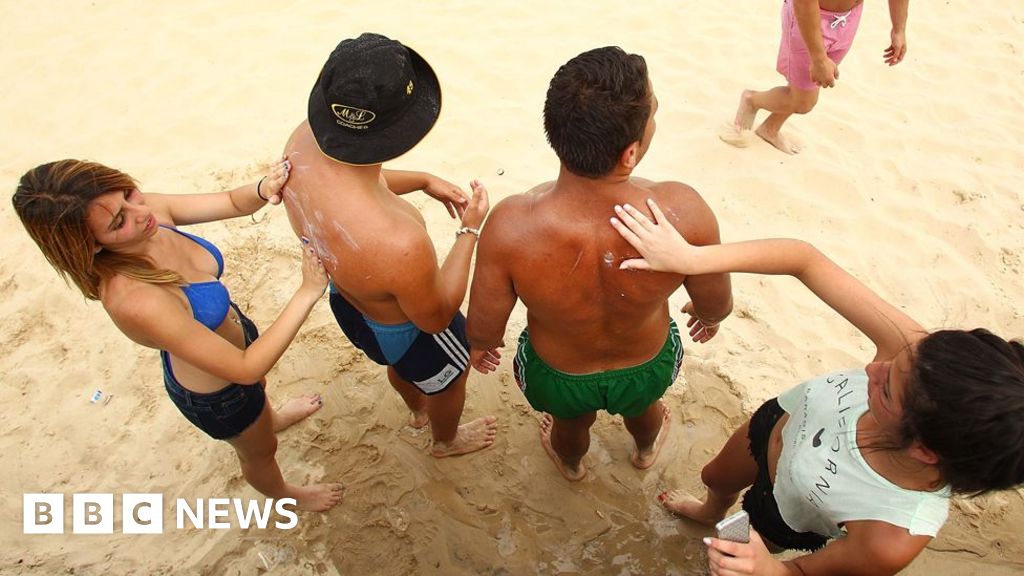Health
Australia Faces Sunscreen Scandal as Popular Brands Fail Tests

Australians are grappling with a sunscreen scandal after independent tests revealed that several popular brands do not provide the sun protection they claim. The findings, released by consumer advocacy group Choice Australia in June 2023, have sparked outrage among consumers and led to a national investigation.
Rach, a 34-year-old mother from Newcastle, epitomizes the anxiety many Australians feel regarding sun exposure. Growing up in a country known as the skin cancer capital of the world, she was raised with constant reminders about sun safety. Despite her diligent application of sunscreen, Rach was shocked to discover a basal cell carcinoma on her nose during a check-up in November. The diagnosis left her feeling confused and angry, especially after learning that the sunscreen she had relied upon for years had failed to deliver adequate protection.
The investigation by Choice Australia tested 20 sunscreen products and found that a staggering 16 did not meet their stated SPF (sun protection factor) ratings. Among those identified was the Ultra Violette Lean Screen SPF 50+ Mattifying Zinc Skinscreen, which returned a disappointing result of only SPF 4. This prompted Choice to conduct a second test, which yielded similar results.
Industry Response and Regulatory Scrutiny
The fallout from these revelations has been swift. Many brands, including Neutrogena, Banana Boat, and Bondi Sands, disputed Choice’s findings, asserting that their own independent testing demonstrated their products’ effectiveness. However, the Therapeutic Goods Administration (TGA) has launched an investigation into the claims and indicated that regulatory action may follow.
Ultra Violette initially defended its product, citing extensive testing and its international presence in nearly 30 countries. Yet, within two months of the report, the company announced a recall of Lean Screen due to inconsistent lab results. “We are deeply sorry that one of our products has fallen short of the standards we pride ourselves on,” the brand stated on Instagram, emphasizing its commitment to quality.
This scandal has raised serious questions about the effectiveness of sunscreen regulation in Australia and beyond. Despite being classified as therapeutic goods, which subjects them to stringent regulations, the recent findings suggest that the industry may be facing systemic issues.
Michelle Wong, a cosmetic chemist, pointed out that the problem is not limited to Australia. Many sunscreen brands use similar manufacturers and testing laboratories, raising concerns about the reliability of SPF ratings globally. “Until someone goes out and tests a whole bunch of sunscreens in other countries, we just don’t know the extent of it,” she stated.
The Human Cost of Misinformation
For individuals like Rach, the implications of the sunscreen scandal are deeply personal. She expressed her frustration, stating that a refund would not reverse years of potential sun damage. “I just had like the five stages of grief,” she explained, reflecting on her emotional journey following the diagnosis and subsequent news about the sunscreen’s inefficacy.
Choice Australia has called for further investigations into the sunscreen market and urged brands to remove products with questionable SPF protection from the shelves. Rosie Thomas, the director of campaigns for Choice, emphasized the urgency of addressing the apparent issues within the industry.
Dr. Wong noted that while the panic surrounding the scandal may be somewhat exaggerated, it serves as a reminder that sunscreen efficacy is crucial for public health. She highlighted that the most effective way to use sunscreen is to apply it generously and reapply every two hours, especially after swimming or sweating.
The ongoing inquiry into the sunscreen industry underscores the importance of transparency and accountability among manufacturers. As Australians continue to navigate their complex relationship with sun safety, the fallout from this scandal will likely have lasting effects on consumer trust and regulatory practices in the sunscreen market.
-

 Entertainment2 months ago
Entertainment2 months agoIconic 90s TV Show House Hits Market for £1.1 Million
-

 Lifestyle4 months ago
Lifestyle4 months agoMilk Bank Urges Mothers to Donate for Premature Babies’ Health
-

 Sports3 months ago
Sports3 months agoAlessia Russo Signs Long-Term Deal with Arsenal Ahead of WSL Season
-

 Lifestyle4 months ago
Lifestyle4 months agoShoppers Flock to Discounted Neck Pillow on Amazon for Travel Comfort
-

 Politics4 months ago
Politics4 months agoMuseums Body Critiques EHRC Proposals on Gender Facilities
-

 Business4 months ago
Business4 months agoTrump Visits Europe: Business, Politics, or Leisure?
-

 Lifestyle4 months ago
Lifestyle4 months agoJapanese Teen Sorato Shimizu Breaks U18 100m Record in 10 Seconds
-

 Politics4 months ago
Politics4 months agoCouple Shares Inspiring Love Story Defying Height Stereotypes
-

 World4 months ago
World4 months agoAnglian Water Raises Concerns Over Proposed AI Data Centre
-

 Sports4 months ago
Sports4 months agoBournemouth Dominates Everton with 3-0 Victory in Premier League Summer Series
-

 World4 months ago
World4 months agoWreckage of Missing Russian Passenger Plane Discovered in Flames
-

 Lifestyle4 months ago
Lifestyle4 months agoShoppers Rave About Roman’s £42 Midi Dress, Calling It ‘Elegant’









